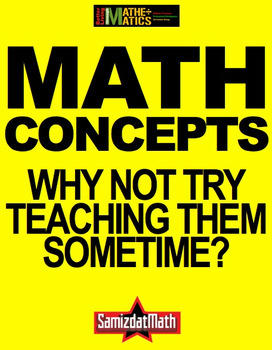Loyal readers know that Robert, the originator of this blog and the proprietor of the online store of the same name, has a very low threshold of tolerance for bad mathematical materials. His past posts on this topic, which includes “Why Singapore Math Will Not Put the US at the Top” and “What Bad Assessment Looks Like, Go Math! Style…” solidly confirms his status as the top curmudgeon for what he terms “the competition to see who has created the worst math curriculum ever.”
While taking a morning walk along the streets of his Free State of Brooklyn last week, Robert happened upon a brand new sealed and complete set of teaching guides for something called “Math 180”, which the publisher’s website describes as follows:
MATH 180 is designed to address the needs of struggling students in grades 5 and up, and their teachers, equally—building students’ confidence with mathematics and accelerating their progress to algebra.
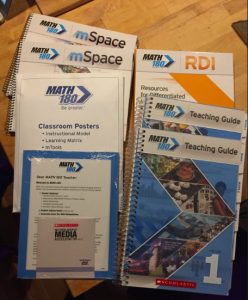
Word Problem: How many mountains of trees had to be pulped to publish just the teaching guides?
I’m going to assume the part about addressing the needs of students AND teachers is an attempt to acknowledge the fact that many teachers of mathematics are unprepared to actually to do their jobs. Mathematics is a technical subject, and unfortunately, many of the teachers who are in the position to educate students in this area are inadequately trained or supported. This is not because they are inept or uncommitted, but because of the low standards of preparation and understanding that we are willing to accept in our schools.
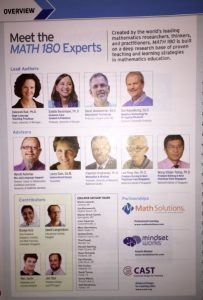
The shameless “experts” who were paid to put their names on this crud.
So Robert schleps home with this box of teaching manuals, which consists of 6 different thick books, a very retro looking CD (remember those?) AND a thick packet of classroom posters, all of which weighs in at just under a fully loaded Mini Cooper. Opening to the “Math 180 Experts” page, Robert finds the usual gallery of “Lead Authors”, “Advisors,” “Contributors,” and the members of an “Educator Advisory Board,” each of whom was most likely offered a nice chunk of change to act as if any of them had any hand in the creation or production of this scheisse.
Robert was impressed at how the people who actually put together this curriculum worked to check off every kind of educational trend, scattering in references to Carol Dweck’s “growth mindset,” to “Universal Design for Learning,” along with “blended learning,” “formative assessment,” and a host of other educational hot topics that probably stimulate the endocrine glands of people who love this kind of stuff. Don’t get him wrong, Robert adores Carol Dweck, and believes that UDL is good stuff, but if you delve a little deeply, you would see that the actual curriculum violates all the precepts that the aforementioned experts would advocate. Oh, and just to make things they didn’t miss ANYONE, they also listed two “advisors,” as well as one “contributor” from Singapore, because we all know that including that semi-repressive city-state’s name in the context of mathematics education will be just the poke textbook adoption committees need in order to sink massive amounts of public money into this cruddy program.
Once you get past all the marketing materials, you see a pretty dull curriculum which uses all the standard models to remediate middle school students who have either fallen behind or were “turned off” by the mathematics instruction they had before. I was especially impressed by the “relevant” word problems the copy editors included. Check out a few of the following:
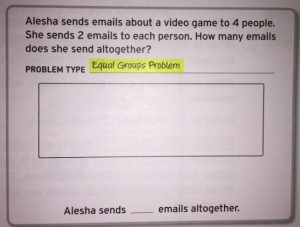
Because using the words “email” and “video games” in a word problem instantly makes it “relevant.”
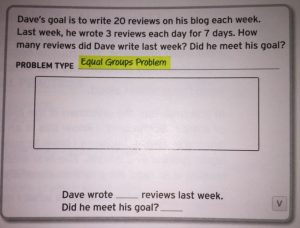
If Dave is writing 20+ reviews each week, when will he have the time to do “Math 180?”
Well, we think you get the point: same old “pseudo-content,” same old teacher centered instructivist methodology, same old reward based assessment (you get “badges” if you reach certain levels while using the online learning materials), all gussied up and pre-digested for your use. Okay, we understand that Scholastic, and the marketing agent, Houghton-Mifflin Harcourt YouNameIt, are profit-making concerns and need to return “value” to their shareholders (which probably includes companies like TIAA-CREF, which manages retirement plans for educators), but c’mon, really? You have all these talented authors, advisors, reviewers, copy editors and art directors, and this is the best you can do?
Robert would especially like to castigate the cast of characters who were bought off to put their names and photos in this worthless pile of junk. Okay, we know the teaching profession is not especially well-compensated, but Deborah Ball, you’re a dean at the University of Michigan! We’re sure you get excellent health insurance and retirement benefits, so is it really worth selling your good name to be a pretend “lead author” of something you probably spent a few hours red-penning over your morning coffee? Let’s get real: Scholastic really should have used its budget to create interesting and compelling content, instead of squandering it on empty endorsements, outdated methodologies, fancy graphic design and inept copy editing.
This post was brought to you by the entirely unprofitable concern known as SamizdatMath, and matho-educational syndicate which develops and self-publishes uncompromising mathematics materials for teachers in grades pre-K and above. This particular rant was brought to you by:

